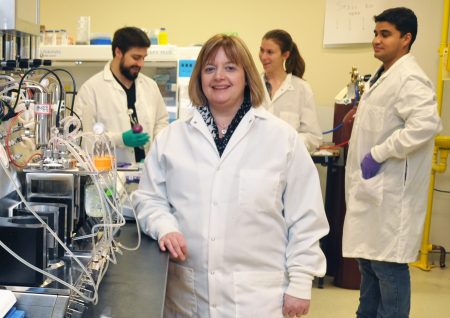A new test for diagnosing colorectal cancer is the goal for a University of Guelph researcher who will receive a new grant from the Canadian Cancer Society (CCS).

Molecular and cellular biology professor Emma Allen-Vercoe will receive $439,750 over three years for her study intended to develop a new diagnostic test.
On average, according to CCS, 26 Canadians will die from colorectal cancer each day. It is estimated by CCS that in 2017, more than 26,000 Canadians will be diagnosed with this cancer.
Allen-Vercoe and her research team will study the effects of Fusobacterium nucleatum, a microbe shown to be associated with colorectal cancer.
“By focusing on aspects of the bacterium that may be directly involved with causing colorectal cancer, we can develop tests that look for these aspects rather than just for the microbe itself,” Allen-Vercoe said.
“This is important because not all strains of F. nucleatum appear to be associated with colorectal cancer, and some strains may be benign.”
In a previous CCS-funded study, Allen-Vercoe found indications that the pathogen spreads to other parts of the body through the bloodstream.
“Since the microbe is predominantly found in the mouth, we also want to compare how F. nucleatum interacts with host cells from different parts of the body,” she said.
By learning how the microbe infects host cells, she hopes to reduce or prevent detrimental effects.
She will use RNA sequencing to understand how cells communicate with each other during infection.
“We hope that in addition to developing a diagnostic test, developing an understanding of host-pathogen interactions will lead to new therapies or even preventive measures.”